Warhammer 40,000: Rogue Trader is a game that I have been waiting a long time for. It’s not quite the first 40k video game that I dreamed of – that’d be the Primarch fighting game my friends and I dreamed up at age 11 – but ever since getting over my youthful “wow, cool Space Marine” phase, I’ve wanted a 40k game that really gets into the finer details of the setting.
The Imperium, the form that human society takes in the grim darkness of the far future, is by far the best thing about 40k – but it’s frequently obfuscated. 40k adaptations tend to either go all in on the action, or stick with the warfare and high level strategy of the tabletop game. On top of that, I suspect Games Workshop’s need to market to children conflicts with how truly horrible the Imperium is. After all, it’s much easier to get Little Timmy’s Mum to splash out on toy soldiers when they’re depicted as heroic defenders of humanity, instead of the brainwashed fascist enforcers they truly are. As a result, the darkly satirical elements of 40k tend to be buried in the novels and other ancillary media, making it all too easy to take the surface at face value.
Owlcat Games’ Rogue Trader is based on the 2009 pen-and-paper RPG of the same name, which should come as no surprise; the studio made its own name with adaptations of the Pathfinder RPG. If you’ve played Kingmaker or Wrath of the Righteous, the broad strokes of Rogue Trader will be immediately familiar: a party-based CRPG that hews closely to the pen-and-paper original, combining a sprawling narrative with deep turn-based tactical combat. After creating your character, you’ll play through an introductory section before being thrust into a position of power – one that conveniently allows for both agonising decision making and gallivanting about the place on adventures. The big difference this time is one of scale. 40k is all about maximalism, after all. Everything is bigger and badder and defined by an urge for more.
The position of rogue trader, meanwhile, is a unique one within the Imperium, with freedoms unattainable by the heaving masses of its strict, theocratic society. As the name suggests, they’re merchant princes empowered to do just about anything in the name of creating profit for the Imperium and expanding its borders, sort of like Del Boy Trotter in charge of the East India Trading Company. Your character in Rogue Trader, then, isn’t some newbie adventurer; instead the origin you select makes you a high-ranking military officer, a crime lord or a noble, someone already accomplished and important. Not only that, you’re a potential heir to the Von Valencius rogue trader dynasty. (Spoilers: you quickly get the job thrust upon you.)
As a result, your character isn’t just schlepping around Fantasy France or something; instead you have an entire galactic sector to explore, with decisions changing the fate of planets inhabited by millions. Your ship is crewed by tens, if not hundreds of thousands of people, entire clans of serfs who are born, live, work and die on the ship without seeing more than a deck or two, let alone leave the ship. You’ll engage in space battles, manage colonies and direct massive planetary assaults. But this is also still very much a party-based tactical game at heart. The majority of the time is spent traversing dungeon-like environments and shooting lots of people in the face.
And, oh boy, is that some crunchy face-shooting to get your teeth into. At its best, Rogue Trader’s combat is an intricately brutal brain-teaser that is solved by taking down your opponents before you can be overwhelmed by the weight of fire – though it can take some getting into.
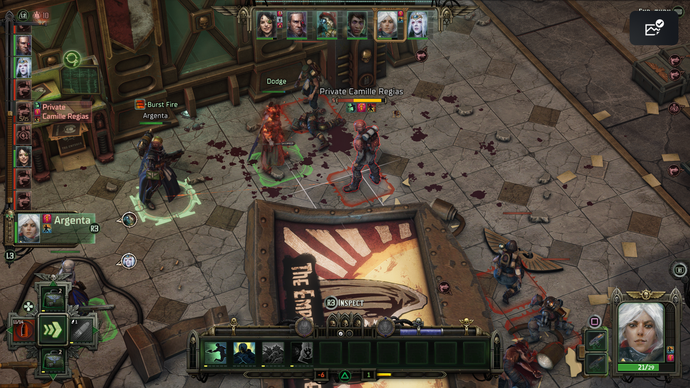
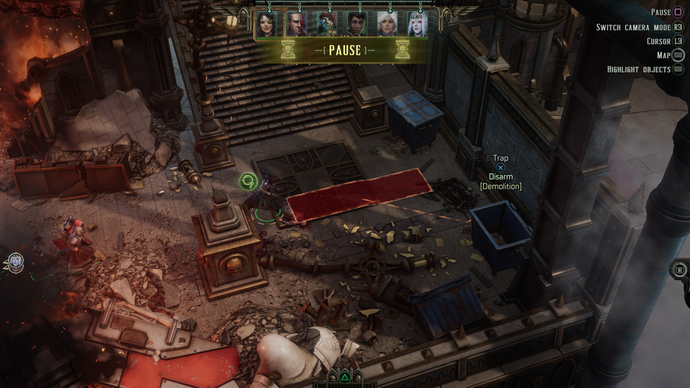
Owlcat’s Pathfinder adaptations were already bewilderingly dense at times, but the d100-based rules that Rogue Trader are built around are arguably much more complex. From the moment of character creation onwards, you’re expected to choose talents and skills with text like “for the next attack against a target affected by an exploit, that target’s cover efficiency will be reduced by -(5 + (PER bonus x stacks of exploit))%. This attack will have +(5 + PER bonus- x stacks of exploit)% hit chance”. Even after hundreds of hours with the game, making sense of that kind of tooltip remains a struggle. The result is a feeling that I’m often just choosing things based on what makes the number go up.
Thankfully, the combat itself is much easier to get your head around. Acting in randomised initiative order, your six party members each get a number of movement points and action points to use each turn. You can move and use abilities as you see fit, but attacking prevents you from moving any further and you’re limited to one attack each turn. Or at least you are to begin with. Much of the fun is in figuring out how to use various character’s abilities to break those rules and deal out death and destruction as efficiently as possible.
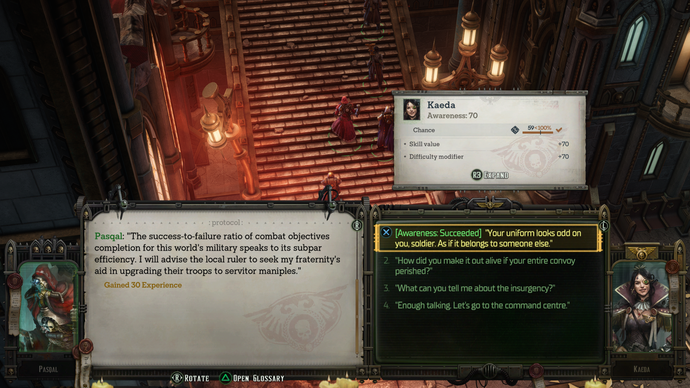
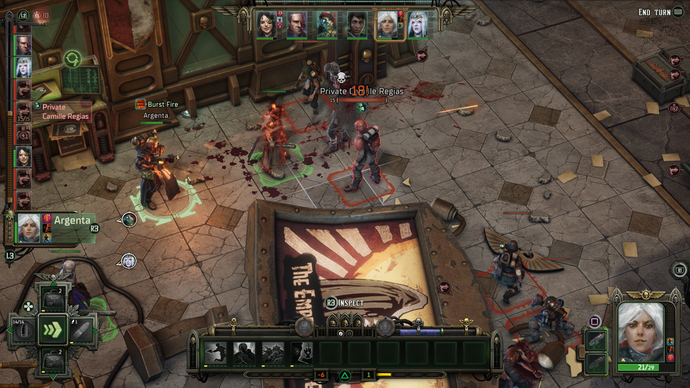
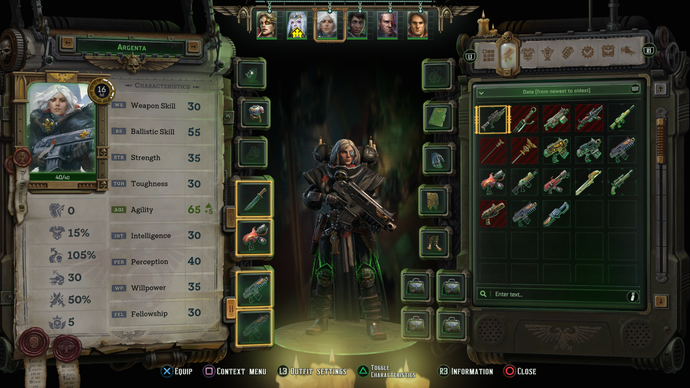
Enabling this are abilities, particularly from the Officer archetype, that focus on buffing other party members and giving them extra opportunities to act. I’ve had entire encounters carried by two characters, one Soldier built around getting to make as many attacks as possible each turn, and an Officer that can happily give them three or four turns in a round. It’s a good thing, really, because your characters tend to be fairly squishy and generally horribly outnumbered, with even super tough bosses accompanied by hordes of minions. And increasing the appeal for 40k fans, everything looks and sounds exactly as you’d expect. Tearing apart swathes of cultists with a heavy bolter is just as satisfying the hundredth time as it is the first.
This note-perfect recreation of the setting is evident throughout Rogue Trader, particularly in its take on RPG morality. Certain dialogue choices lead you along one of three different paths: Dogmatically toeing the Imperial party line, Heretically worshipping the Chaos Gods or Iconoclastically, well, trying to be a decent person. The default here is doing terrible things in the name of the Imperium, committing heinous acts to ensure that humanity survives one more day in a hostile universe. When some of your party inevitably leaves because you’ve been too heretical, it’s not because you committed evil acts, it’s because you did them for the wrong reason. Trying to be a hero is possible, but never made easy.
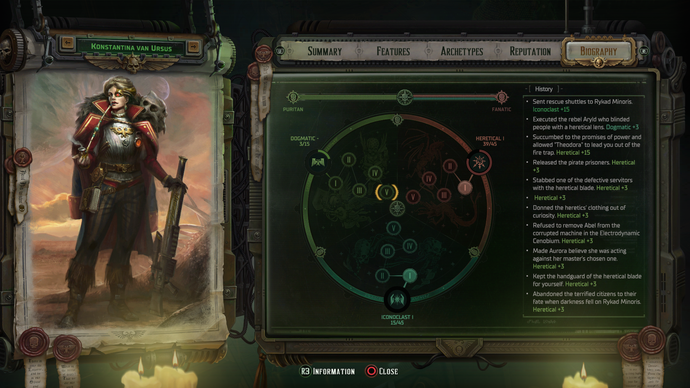
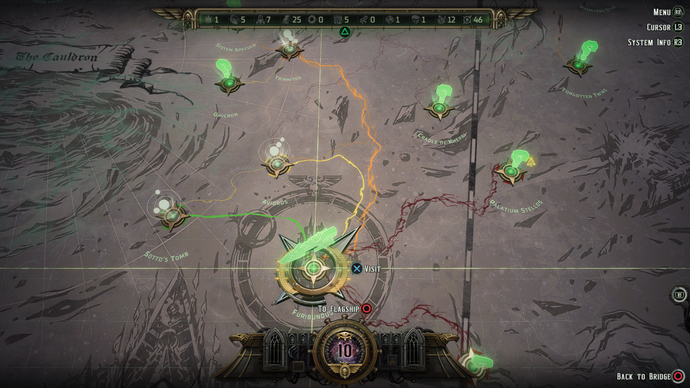
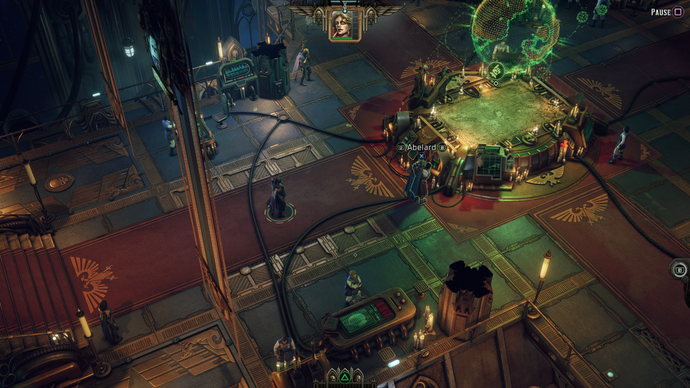
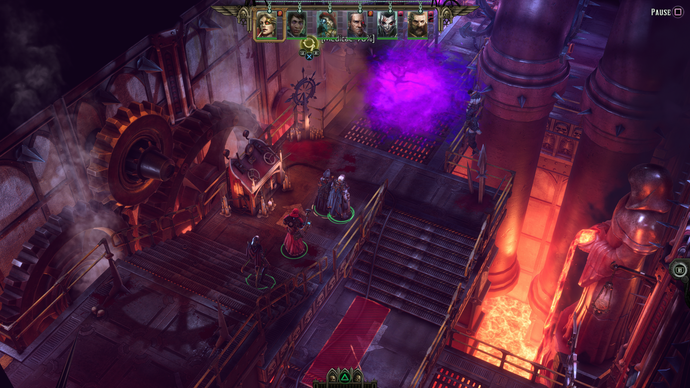
What would be easy is for Rogue Trader to take the grimness and darkness of 40k and simply become a misanthropic mess of unlikeable characters and general misery, but Owlcat has managed to make both the individual struggles of the NPCs you encounter and the overarching story (which can easily last over 100 hours) deep and compelling. The tough and inevitably horrible decisions being made feel justified by the narrative, but never excused, and you will always feel aware of them, without being punished for playing the game the way it was intended.
Unfortunately, the game is let down by some terrible performance and a lot of bugs. I was playing on PS5 (not my preferred platform for this sort of thing, but it just about works) and was met by an assortment of bugs, crashes and, on one occasion, a patch that rendered existing saves completely unplayable until it got fixed. Perhaps most egregiously, for an RPG, were bugs that broke entire questlines, particularly around companion stories. There’s little worse than spending dozens of hours getting to know a character, maybe even engaging in a little romance, all for them to suddenly forget it ever happened, or decide that they actually hate you. Speaking to chums playing on PC and looking around the wider community, even high-end PC performance hasn’t been much better.
It’s a shame that releasing games in a clearly half-baked state has also become an Owlcat hallmark, as the studio historically does a damn fine job of getting them fixed up nicely given enough time. The combat’s complexity is surmountable, and the overall bleakness of the dystopian setting is part of 40k’s charm, so the technical issues are the only real sticking point for Rogue Trader. Owlcat has been hard at work tackling these problems, with regular patches that have already squashed the bigger bugs. It’s still worth giving it a few more months, but if you can’t wait, there shouldn’t be anything stopping you from having a good time. Rogue Trader is bloated and maximalist, arcane and overwrought. In short, it’s the perfect 40k game.
A copy of Warhammer 40K: Rogue Trader was independently sourced for review by Eurogamer.
